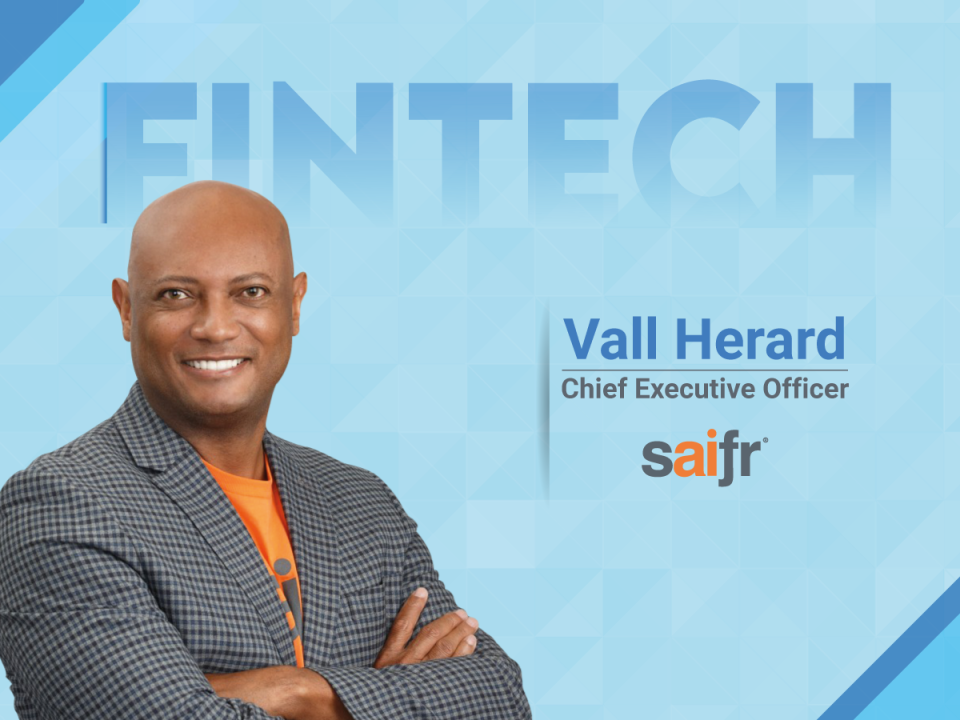Hi Vall, tell us about yourself and more about your role at Saifr…
I’m the CEO of Saifr, an AI-powered risk prevention and management solution for safeguarding consumers and organizations. Saifr is a part of Fidelity Labs, Fidelity Investments’ in-house fintech incubator.
Like most folks, I’ve made a few strategic pivots in my career. Initially, I had aspirations in mechanical engineering and economics, but I found my way to Wall Street instead. There, I worked as an analyst in unit investment trusts and mutual funds for several prominent financial institutions. Then, I began consulting and implementing risk management systems on a global scale, with a particular focus on financial market risk—my area of expertise. These experiences led me to product marketing and sales risk mitigation roles at quite a few successful fintechs. The rest, as they say, is history.
Currently, at Fidelity Labs, I focus on innovation in regulatory compliance using AI-driven solutions. I co-developed Saifr, a compliance review tool leveraging proprietary, high-quality, human-reviewed data. This initiative idea—born from a chance meeting at a compliance conference—has grown to encompass a wide range of AI-based compliance solutions, including our most recent release, SaifrScreen.
We’d love to hear about Saifr, its journey since inception and more about the new AI-powered adverse media screening feature?
Saifr’s initial business case was developed in 2020 building on our unique access to data—millions of documents representing the work of thousands of marketing and compliance experts in various lines of business. That same year we created a prototype, gathered user feedback, and began the engineering work. Saifr officially launched in January of 2022 offering marketing, legal, and compliance teams within financial services a way to reduce friction in their content creation, approval, and filing processes. Over time, we added more functionality such that our AI “understands” content as it is created; highlights potential marketing and compliance risks in text, images, video, and audio; explains why the risk was flagged; proposes alternative language; and suggests relevant disclosures. Saifr’s AI can flag 90% of what a human would. With Saifr’s workflow tool, add-ins, or APIs, clients can experience cost savings, 10x faster time to market, and reduced risk exposure. In 2023, the awards started piling up as our efforts to use advanced AI were getting noticed as leading in the market.
In May of this year, 2024, we announced our new product, SaifrScreen, which helps firms comply with KYC/AML regulations. SaifrScreen uses unstructured data and advanced AI to help detect more true bad actors with fewer false positives. Most media screening tools only flag threats from structured data, including sanctions, wanted lists, and watch lists. SaifrScreen goes further by searching unstructured data like news, social media, government records, and more to provide a comprehensive (and ongoing) compliance screening process. We also use layers of LLMs and NLP models that feed into one another to understand the details and sentiment of adverse media sources, enabling precise matches of searches to risks.
What are some of the top concerns surrounding financial crime today and what should FIs and banks be doing more of to address these ongoing challenges?
Two top concerns are the increasing volume and sophistication of financial crime attacks. Criminals are adopting AI tools to commit crimes, often targeting the elderly, using methods like fake emails, communications and deep fakes. To combat this, financial institutions need to leverage AI to address the volume and fight fire with fire against the sophisticated AI-powered attacks, rather than relying on manual human review which doesn’t scale.
Can you talk about some effective ways in which global banks have deployed new age tools to combat fraud and crime?
Global banks are beginning to start deploying AI-driven tools to enhance their fraud detection and prevention capabilities. These tools are used to screen clients during onboarding and monitor transactions on an ongoing basis, enabling banks to identify anomalies and potential fraud at scale. This approach is particularly important because criminals may target long-term, previously reliable clients by stealing their identities and conducting small, inconspicuous transactions to avoid triggering traditional fraud detection systems. AI algorithms are well-suited to detect these subtle patterns that may be difficult for human analysts to identify, providing an additional layer of protection against financial crime.
As financial crimes become more sophisticated, what would you share with end users as tips and best practices?
Customers should always be vigilant and skeptical when it comes to protecting themselves against sophisticated financial crimes, verifying the authenticity of requests through official channels and safeguarding personal and financial information. Use strong, unique passwords for each account, enable multi-factor authentication and be cautious when using public Wi-Fi networks. Keep your software and systems updated with the latest security features, and regularly monitor your accounts and statements for suspicious activity. Be wary of phishing attempts that try to trick you into revealing sensitive information and use secure payment methods like credit cards or reputable platforms when making online transactions.
Can you share a few thoughts and observations on the global fintech market and how you feel this segment will shape up down the line?
The global fintech market is experiencing explosive growth, with over 13,000 startups in the US alone, each racing to scale rapidly and capture market share. However, this breakneck pace often comes at the expense of robust compliance measures, making these platforms attractive targets for financial criminals. To safeguard their businesses and customers, fintech companies must prioritize implementing scalable, affordable client onboarding and monitoring solutions that can keep pace with their global growth. As the fintech sector continues to evolve, those that can successfully balance innovation with effective compliance measures will be best positioned to thrive in the long run.
Read More: Turning to AI to Address Financial Crime, Regulatory Compliance
[To share your insights with us, please write to psen@itechseries.com ]
Saifr, a RegTech within Fidelity Investment’s innovation incubator, Fidelity Labs, is committed to safeguarding organizations from pervasive AI and regulatory risks.
Vall Herard, is CEO of Saifr
